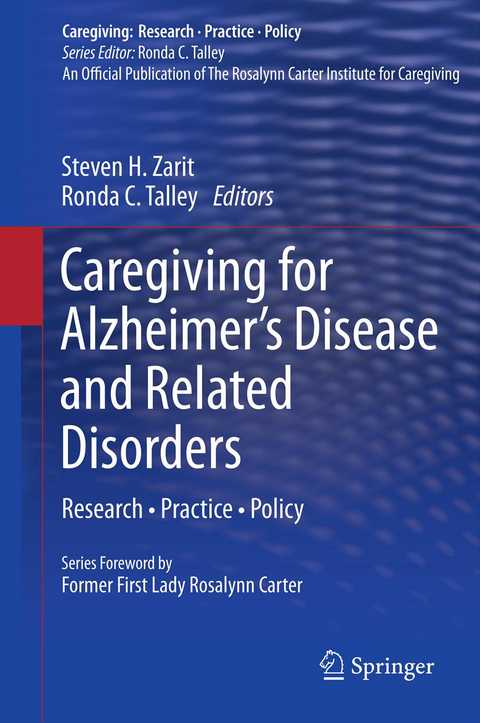
Caregiving for Alzheimer’s Disease and Related Disorders
Springer-Verlag New York Inc.
978-1-4899-9151-5 (ISBN)
Assisting someone with Alzheimer’s disease or another illness that causes dementia is incredibly demanding and stressful for the family. Like many disabling conditions, Alzheimer’s disease leads to difficulty or inability to carry out common activities of daily life, and so family members take over a variety of tasks ranging from managing the person’s finances to helping with intimate activities such as bathing and dressing.
Key coverage in Caregiving for Alzheimer’s Disease and Related Disorders includes:
Early diagnosis and family dynamics
Emotional needs of caregivers
Developmentally appropriate long-term care for people with Alzheimer’s
Family caregivers as members of the Alzheimer’s treatment Team
Legal and ethical issues for caregivers
Faith and spirituality
The economics of caring for individuals with Alzheimer’s disease
Cultural, racial, ethnic, and socioeconomic issues of minority caregivers
Advances in Alzheimer’s disease research
Caregiving for Alzheimer’s Disease and Related Disorders offers a wealth of insights and ideas for researchers, practitioners, and graduate students across the caregiving fields, including psychology, social work, public health, geriatrics and gerontology, and medicine as well as public and education policy makers.
Steven H. Zarit, PhD, is Professor and Head of the Department of Human Development and Family Studies at Pennsylvania State University, and is also Adjunct Professor at the Institute of Gerontology, Jönköping University, Jönköping, Sweden. He has conducted research on late-life issues, particularly family caregiving and adaptation for older adults. Dr. Zarit is a recipient of the Distinguished Career Contribution Award from the Gerontological Society of America. Ronda C. Talley, PhD, MPH, is Professor of Psychology at Western Kentucky University. Her prior work experience includes providing leadership on caregiving issues and organizational development as Executive Director of the Rosalynn Carter Institute for Caregiving; working with national government groups to promote caregiving issues as Associate Director of Legislation, Policy, and Planning/Health Scientist for the Centers for Disease Control and Prevention, U.S. Department of Health and Human Services; and promoting the science and practice of psychology in the schools as Associate Executive Director of Education and Director of School Policy and Practice at the American Psychological Association. Dr. Talley, as Adjunct Associate Professor, taught ethics and legal issues in school psychology at the University of Maryland, College Park.Dr. Talley received the Outstanding Alumni Award from Indiana University and the Jack Bardon Distinguished Service Award from the Division of School Psychology of the American Psychological Association. She serves on the national board of the American Association of Caregiving Youth and is a member of the Indiana University School of Education National Board of Visitors.
Preface.- Alzheimer’s Disease Caregiving: The Needs of Family Caregivers.- Section I: Issues Affecting the Care Triad.- Chapter 1. Early Diagnosis of Alzheimer’s Disease: Caregiving, and Family Dynamics.- Chapter 2. Psychosocial Interventions to Address the Emotional Needs of Caregivers of Individuals with Alzheimer’s Disease.- Chapter 3. Education, Training, and Support Programs for Caregivers of Individuals with Alzheimer’s Disease.- Section II: Issues in Providing Quality Care.- Chapter 4. Developmentally Appropriate Long-Term Care for People with Alzheimer’s Disease and Related Disorders.- Chapter 5. The Economics of Caring for Individuals with Alzheimer’s Disease.- Chapter 6. Faith and Spirituality: Supporting Caregivers of Individuals with Dementia.- Chapter 7. Family Caregivers as Members of the Alzheimer’s Treatment Team.- Chapter 8. End-of-Life Issues for Caregivers of Individuals with Alzheimer’s Disease and Related Dementias.- Section III: Cross-cutting Issues Impacting Caregivers and Caregiving.- Chapter 9. Ethical Issues: Perspective 1: Providing Care for Individuals with Alzheimer’s Disease: Practice, Education, and Research.- Chapter 10. Ethical Issues: Perspective 2: The Fundamental Role of Personhood.- Chapter 11. Legal Issues for Caregivers of Individuals with Alzheimer’s Disease.- Chapter 12. Advances in Alzheimer’s Disease Research: Implications for Family Caregiving.
| Erscheint lt. Verlag | 13.12.2014 |
|---|---|
| Reihe/Serie | Caregiving: Research • Practice • Policy |
| Zusatzinfo | XXVIII, 208 p. |
| Verlagsort | New York |
| Sprache | englisch |
| Maße | 155 x 235 mm |
| Themenwelt | Geisteswissenschaften ► Psychologie ► Klinische Psychologie |
| Medizin / Pharmazie ► Gesundheitswesen | |
| Medizin / Pharmazie ► Medizinische Fachgebiete ► Geriatrie | |
| Medizin / Pharmazie ► Medizinische Fachgebiete ► Psychiatrie / Psychotherapie | |
| Studium ► Querschnittsbereiche ► Prävention / Gesundheitsförderung | |
| Sozialwissenschaften ► Pädagogik ► Sozialpädagogik | |
| Sozialwissenschaften ► Politik / Verwaltung ► Staat / Verwaltung | |
| Sozialwissenschaften ► Soziologie | |
| Wirtschaft | |
| Schlagworte | Alzheimer’s Disease Caregiving • Alzheimer’s treatment team • Care Triad • Developmentally appropriate care for people with AD • Early Diagnosis of Alzheimer’s Disease • Education, training, and support programs for Alzheimer’s |
| ISBN-10 | 1-4899-9151-4 / 1489991514 |
| ISBN-13 | 978-1-4899-9151-5 / 9781489991515 |
| Zustand | Neuware |
| Haben Sie eine Frage zum Produkt? |
aus dem Bereich


